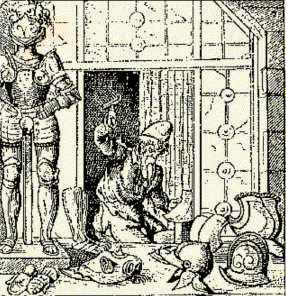An armourer
By Shakespeare's day armour was virtually useless in actual war, because of the new efficiency of firearms*, but armour was still used for ceremonial occasions such as tournaments. In Henry IV, Part One, Hotspur speaks scathingly of a "perfumed" lord who "but for these vile guns,/. . . would himself have been a soldier" (1.3.62-3).
Armour is a powerful symbol of the exterior that differs from the person wearing it. In Troilus and Cressida, Hector pursues a Greek who is wearing particularly gorgeous armour; when he has killed him, he remarks: "Most putrefied core, so fair without [outside], / Thy goodly armour thus hath cost thy life" (5.8.1-2).
Armour also plays an important symbolic role in this scene from Antony and Cleopatra:
Antony: Come, mine armour, Eros!
[Enter Eros with armour]
Come, good fellow, put thine iron on. . .
Cleopatra: Nay, I'll help too.
What's this for?
Antony: Ah, let be, let be! Thou art
The armourer of my heart. False, false; this this.
Cleopatra: Sooth, la, I'll help: thus it must be.
Antony: Well, well,
We shall thrive now. . .
Cleopatra: Is not this buckled well?
Antony: Rarely, rarely.
(4.4.2-11)
- Primary sources concerning arts of combat.
- The Historical Armed Combat Association maintains an extensive site on armour and combat.
